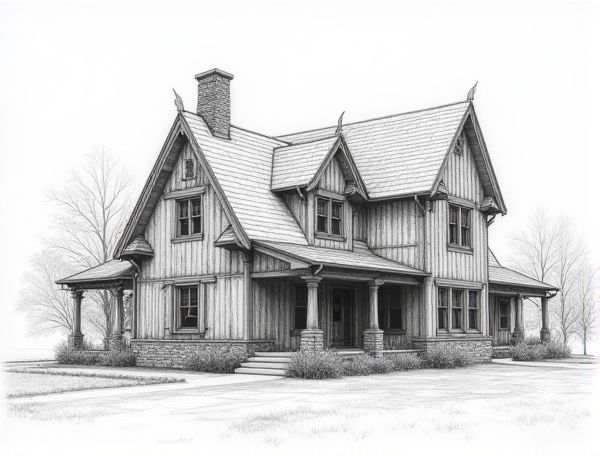
Photo illustration: Colonial home design with Dutch gambrel roof
Colonial home design featuring a Dutch gambrel roof blends classic symmetry with distinctive curved lines that maximize upper-level space and add historical charm to your residence. Discover how this architectural style can enhance your home's aesthetic and functionality by reading more in the article.
Introduction to Colonial Home Design
Colonial home design features symmetrical facades, evenly spaced windows, and central front doors, reflecting 17th- and 18th-century American architecture. Key elements include gabled roofs, double-hung sash windows with shutters, and decorative crown moldings. This style emphasizes simplicity, balance, and practicality, making it a timeless choice in residential architecture.
Origins of the Dutch Gambrel Roof
The Dutch gambrel roof, originating in 17th-century colonial America, combines European roof styles, particularly Dutch and English influences. This distinctive double-pitched design enhances attic space and improves water drainage, making it ideal for homes in varied climates. Its architectural heritage reflects practical adaptations to harsh weather while offering the classic aesthetic associated with early Dutch settlers.
Key Features of Colonial Homes
Colonial homes showcase symmetrical facades, multi-pane windows, and prominent central chimneys, reflecting their 18th-century American origins. You will find classic elements like gabled roofs, shuttered windows, and spacious front porches that enhance both aesthetics and functionality. These timeless features create a balanced and inviting living space, ideal for traditional home design.
Architectural Advantages of the Gambrel Roof
The Gambrel roof offers superior attic space and enhanced headroom due to its dual-sloped design, maximizing usable interior volume compared to traditional gable roofs. Its steep lower slope efficiently sheds water and snow, reducing maintenance and improving durability in various climates.
Materials Commonly Used in Dutch Gambrel Roofs
Dutch gambrel roofs commonly utilize wood, asphalt shingles, and metal for durability and aesthetic appeal. Your choice of materials influences the roof's insulation, weather resistance, and overall architectural style.
Exterior Elements of Colonial Homes
Colonial homes showcase classic exterior elements such as symmetrical facades, multi-pane windows, and decorative shutters that emphasize their timeless charm. You can enhance curb appeal with traditional entryways featuring pediments, columns, and paneled doors often painted in bold, contrasting colors. Incorporating brick or clapboard siding preserves the authentic Colonial aesthetic while ensuring durability and low maintenance.
Interior Layouts in Colonial Dutch Houses
Colonial Dutch houses feature distinctive interior layouts characterized by central hearths, steep staircases, and spacious, multifunctional rooms designed for both family living and social gatherings. Your design can emphasize traditional elements such as exposed wooden beams, wide plank flooring, and built-in cabinetry to enhance historical authenticity while optimizing space and light flow. Incorporating these details allows you to create an interior that blends colonial charm with modern functionality.
Modern Interpretations of Colonial Gambrel Homes
Modern interpretations of colonial gambrel homes blend traditional barn-inspired gambrel roofs with contemporary materials and open-concept interiors, enhancing natural light and spatial flow. These designs often incorporate energy-efficient windows, minimalist finishes, and mixed-use spaces that respect historical aesthetics while meeting modern lifestyle needs.
Maintenance Tips for Gambrel Roofs
Regular inspection and cleaning of gambrel roofs prevent debris buildup and water damage, preserving the unique dual-slope design. Applying a high-quality sealant on shingles and flashing enhances weather resistance and prolongs roof lifespan. Promptly repairing loose or damaged shingles and ensuring proper attic ventilation reduces moisture accumulation and structural issues.
Incorporating Colonial Charm in Contemporary Homes
Incorporating Colonial charm into contemporary homes blends timeless architectural details like symmetrical facades, multi-pane windows, and classic crown molding with modern open-concept layouts and minimalist decor. Your design can achieve a harmonious balance by integrating traditional wood finishes, vintage light fixtures, and muted color palettes that evoke historical elegance while maintaining modern functionality.
 homedesy.com
homedesy.com